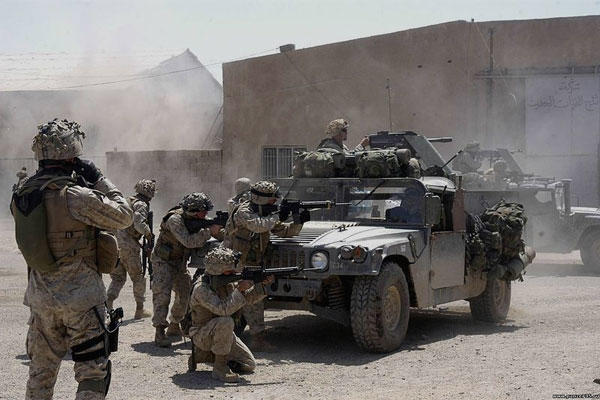Wade Spann remembers pushing into the city of Fallujah, Iraq, under cover of darkness on April 4, 2004, as an infantry assaultman with 1st Battalion, 5th Marines, bayonets fixed atop their rifles to send a clear message to the enemy insurgents within.
Thinking back on the assault that would become the largest urban battle since Vietnam, Spann, 33, marvels at the "all-out" nature of the fight and the courage of the troops who entered the city with unarmored Humvees and little previous fighting experience.
"We saw firsthand how 'wild, wild west' it was," he said. "We saw [rocket-propelled grenades] skipped across the roads towards us."
More than 120 Americans were killed in the two battles of Fallujah, 54 of them in a bloody nine-day span in November 2004 during the second battle, Operation Phantom Fury. Eleven prestigious Navy Cross medals were approved for actions in Fallujah, two of them posthumous.
In addition, Fallujah produced one of the most enduring and iconic images from the post-9/11 wars: journalist Lucian Read's photograph of a grievously wounded Marine 1st Sgt. Bradley Kasal emerging from what would become known as "Hell House," supported by two Marines. Kasal would receive the Navy Cross for his heroism on that day.
By impact, scope, and significance, Fallujah, experts argue, has earned its place alongside legendary Marine Corps battles from Iwo Jima to Hue City. So is it time that Fallujah, like those predecessors, be memorialized in the name of a Navy ship?
Jerry Hendrix, a retired Navy captain and senior fellow at the Center for a New American Security, has tried to make it happen. A former director of naval history for the Department of the Navy, Hendrix has submitted Fallujah as a ship name twice, most recently for LHA-7, an America-class amphibious ship that was ultimately christened USS Tripoli.
Hendrix said he would like to see two ships tasked with carrying Marines named for battles from the wars in Iraq and Afghanistan. But Fallujah, for him, is an obvious first choice.
"It's the first one that comes to mind," he said.
Another retired Navy officer, a well-known military blogger who goes by the pen name CDR Salamander, first proposed a USS Fallujah on his blog in 2010. Now, more than 11 years after the battle, he believes the time for a Fallujah namesake has more than come.
"We've been at war since, depending on where you draw the line, 2001. And our senior leadership has felt obligated to recognize political peers," he told Military.com. "There has yet been an effort to recognize some of the very heroic battles that this generation has been involved in."
Salamander, who asked that his real name not be used, expressed strong disapproval of Navy Secretary Ray Mabus' decisions to name recent ships after lawmakers, some living.
Controversy has followed Mabus' 2012 naming of the fifth Independence-class littoral combat ship after Democratic former Rep. Gabrielle Giffords, who was wounded in a 2011 mass shooting; the 2010 naming of the 10th San Antonio-Class amphibious transport dock after Democratic Rep. John P. Murtha, who died the same year; and, most recently, the announcement this year that the 70th Arleigh Burke-class guided missile destroyer would be named for Democratic former Sen. Carl. M. Levin, a former Senate Armed Services Committee chairman who retired last January.
The naming of the USS John P. Murtha especially rankled among some Marines and sailors who had been offended by Murtha's opposition to the Iraq war and his public condemnation ahead of a trial of Marines accused of war crimes in Haditha, Iraq, in 2005.
"Fallujah has almost become a reference point to the fact that there are other things our leaders think are more important to name ships after," Salamander said. "I think that's part of it, the bigger picture. The smaller picture, is that the battle of Fallujah, if you were going to pick a battle, that would be in your top five, if not your top three, to pick from [for a ship name]."
Hendrix, who co-wrote a 2012 report for Congress on ship naming practices, maintained that breaches of ship-naming tradition are themselves tradition within the Navy.
"What we found ... is that nothing that Secretary Mabus had done is outside past precedent or past breaking of precedent," he said. "Perhaps the only thing that he could be criticized for is that he made so many exceptions in such a small period of time."
Mabus, Hendrix added, takes the duty of naming ships -- an exclusive purview of the secretary of the Navy -- very seriously.
"He thinks about it very carefully," he said. "But he also proceeds based on his vision and his agenda for the Navy."
Perhaps more crucial to understanding the hesitancy to christen a USS Fallujah is the region's recent history, Hendrix said.
Almost exactly nine years after Operation Phantom Fury, news came in January 2014 that Fallujah had fallen to al-Qaeda militants, a blow that prompted painful reflection among many who had fought there.
WIth that loss still fresh, Hendrix said, it may be too soon to mark the battle with a ship.
"The Iraq War has carried a lot of emotional baggage for people from both political persuasions. Getting people to come to grips with that, it just seems like we've too close to it," he said. "It's not like Iwo Jima, it's not like Tripoli where the situation has sort of stabilized. The sacrifices are deeply felt, and it doesn't seem like there's a lot of appetite at this time."
While the Navy did name a Ticonderoga-class guided missile cruiser after the Vietnamese battle of Hue City, another costly urban conflict in an war fraught with loss, the ship was ordered 19 years after the 1968 battle, Hendrix said, allowing the nation more time to process what had taken place.
But for Adel Abudayeh, a medically retired Marine staff sergeant who fought in Phantom Fury with 3rd Battalion, 1st Marines, Fallujah is about the troops who fought there bravely, not the battle's strategic significance or long-term outcome. Abudayeh, 32, lost his best friend in the battle and remembers a fog of war so intense that one day blended into another in the fighting.
"When we heard the news that Fallujah got retaken by the enemy, there was a whole bunch of people upset," Abudayeh recalled. "But you need to remember that we were tasked to go clear the city of insurgents ... and that's exactly what we did. It was never to conquer that city and hold it forever. I didn't care that [the enemy] took it back."
As the Navy looks to add more amphibious ships to the fleet in coming years, the secretary of the Navy will have multiple opportunities to revisit the possibility of a USS Fallujah. The Navy has yet to announce the name of LHA-8, the third ship in the new America class, planned to enter service in 2024.
A spokesman for Mabus, Navy Lt. Eric Durie, said the ship had yet to be named.
"Sometime before the keel laying or christening the Secretary will make his decision regarding the name of the ship," Durie said in an email to Military.com. "Once that decision is made, Congress is notified of the secretary's choice. Thirty days after this notification is made, the name may be publicly announced."
Hendrix suggested Fallujah might also be an appropriate name for one of the future L(X)Rs, a new class of 11 amphibious ships intended to replace aging dock landing ships. According to a congressional background briefing report, the Navy plans to buy the first of the ships in 2020. If we do see a USS Fallujah, he said, it's likely it will be in the next presidential administration.
It's important that still-young veterans of the Iraq War see their sacrifices memorialized with a ship, said Bart Skiba, a Marine veteran who deployed to Fallujah as a machine gunner with 3rd Battalion, 8th Marines in January 2005 as Phantom Fury was drawing to a close. Skiba, 30, now works for the Department of Justice and is studying military history at a graduate program at George Mason University.
"Marines, we know our history through battles. We talk to one another in a sense of what we have done as a collective. We talk about Chosin Reservoir, Iwo Jima, Belleau Wood," he said. "The Battle [of Fallujah], based on valor, tactics, the pure courage of the Marines, will go down in Marine Corps history. The Marines distinguished themselves."
Spann, the veteran of the first battle of Fallujah, agreed.
"I would love to have a ship named after that battle because it signifies some of the sacrifices the guys made, not only those who were killed, but those who were injured, and the families of the fallen," he said. "It's another battle streamer."
For Abudayeh, though, the real legacy of Fallujah is in the memories of the troops who fought there.
"Are they trying to let the world know what we're capable of? Sure, absolutely," he said. "If it's for us to remember the battle? We are never going to forget what happened there ... we don't need a ship for that."
--Hope Hodge Seck can be reached at hope.seck@military.com. Follow her on Twitter at @HopeSeck.
Related Video:
Semper Fi Always Faithful




















